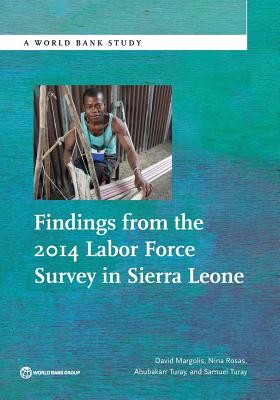
- We will send in 10–14 business days.
- Author: David Margolis
- Publisher: World Bank Publications
- ISBN-10: 1464807426
- ISBN-13: 9781464807428
- Format: 17.5 x 25.2 x 1 cm, minkšti viršeliai
- Language: English
- SAVE -10% with code: EXTRA
Findings from the 2014 Labor Force Survey in Sierra Leone (e-book) (used book) | bookbook.eu
Reviews
Description
Jobs are critical to poverty reduction and inclusive growth in Sierra Leone, where more than half the population is poor and most are dependent on labor earnings. Adding to the jobs challenge is the young and growing population and therefore the need for substantial job creation, coupled with low labor intensity in the mining sector, which has been driving recent growth. Beyond job creation, in a context where most workers are engaged in low productivity jobs, improving the quality of jobs is critical for poverty reduction. Given that Sierra Leone is a post-conflict country, jobs are also central to sustained stability. Yet, despite the importance of jobs for Sierra Leone, the design of policies and interventions to promote these opportunities has been constrained by a limited knowledge base. The 2014 Labor Force Survey report seeks to contribute to solutions to the jobs challenge in Sierra Leone through a foundational analysis of the country's first dedicated labor survey in nearly three decades. The report provides an overview of the employment situation in Sierra Leone, ranging from labor force participation to the types of employment among the working-age population. Through analysis of specialized modules, the report sheds light on key constraints to self-employment in agricultural activities and non-farm household enterprises, which are, respectively, the first- and second-largest sources of jobs in the economy. It also highlights the extent of informality in both wage employment and non-farm self-employment as well as how an individual's status in the labor market relates to income poverty. The report also presents information on skills levels and how basic skills are acquired by the working age population. Finally, the report discusses issues related to youth employment and the specific constraints faced by youth in gaining access to productive job opportunities.
EXTRA 10 % discount with code: EXTRA
The promotion ends in 22d.16:28:58
The discount code is valid when purchasing from 10 €. Discounts do not stack.
- Author: David Margolis
- Publisher: World Bank Publications
- ISBN-10: 1464807426
- ISBN-13: 9781464807428
- Format: 17.5 x 25.2 x 1 cm, minkšti viršeliai
- Language: English English
Jobs are critical to poverty reduction and inclusive growth in Sierra Leone, where more than half the population is poor and most are dependent on labor earnings. Adding to the jobs challenge is the young and growing population and therefore the need for substantial job creation, coupled with low labor intensity in the mining sector, which has been driving recent growth. Beyond job creation, in a context where most workers are engaged in low productivity jobs, improving the quality of jobs is critical for poverty reduction. Given that Sierra Leone is a post-conflict country, jobs are also central to sustained stability. Yet, despite the importance of jobs for Sierra Leone, the design of policies and interventions to promote these opportunities has been constrained by a limited knowledge base. The 2014 Labor Force Survey report seeks to contribute to solutions to the jobs challenge in Sierra Leone through a foundational analysis of the country's first dedicated labor survey in nearly three decades. The report provides an overview of the employment situation in Sierra Leone, ranging from labor force participation to the types of employment among the working-age population. Through analysis of specialized modules, the report sheds light on key constraints to self-employment in agricultural activities and non-farm household enterprises, which are, respectively, the first- and second-largest sources of jobs in the economy. It also highlights the extent of informality in both wage employment and non-farm self-employment as well as how an individual's status in the labor market relates to income poverty. The report also presents information on skills levels and how basic skills are acquired by the working age population. Finally, the report discusses issues related to youth employment and the specific constraints faced by youth in gaining access to productive job opportunities.


Reviews